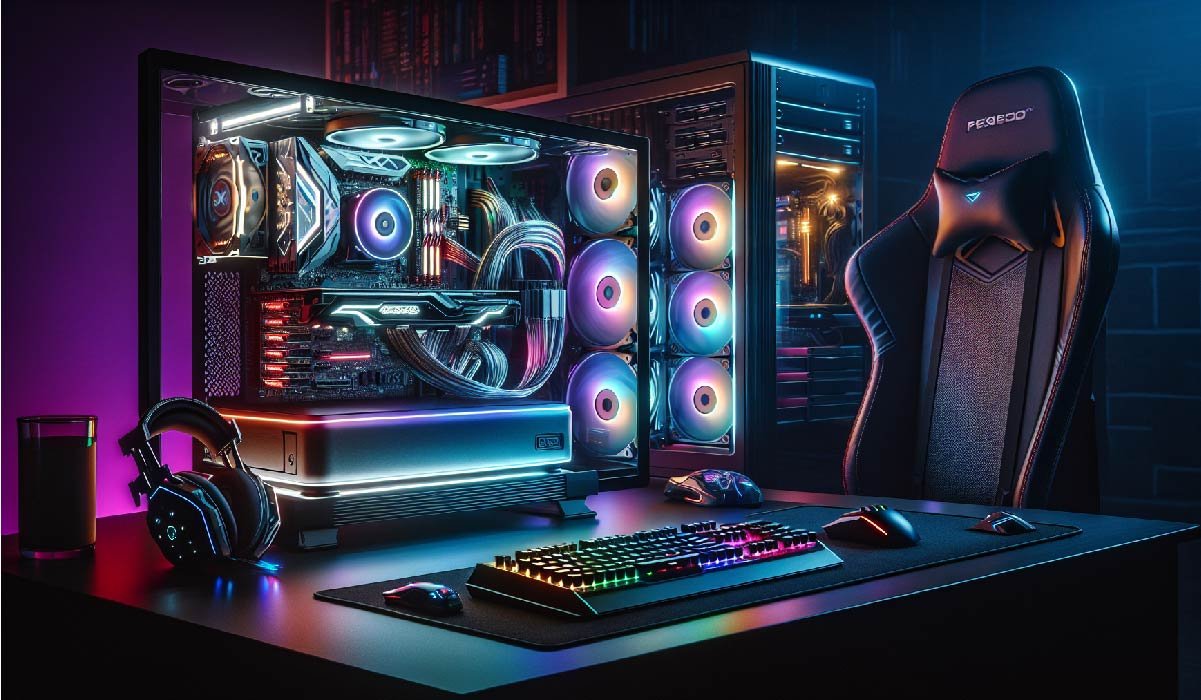Games
Unlock Peak Performance: The Ultimate Guide to Choosing the Perfect Gaming PC

Selecting the ideal gaming PC requires careful consideration of various components, each playing a crucial role in delivering the best performance. With the plethora of options available in the market, determining the right configuration can be daunting. This guide aims to demystify the process of choosing the perfect gaming PC.
Understanding Your Gaming Needs
The journey to finding the ultimate gaming PC begins with understanding your gaming preferences and objectives. Are you a casual gamer who enjoys mainstream titles, or do you aspire to engage in competitive esports? Identifying your gaming objectives will help determine the necessary specifications your gaming PC should have.
Central Processing Unit (CPU)
The CPU is the brain of your gaming PC. It is responsible for executing instructions and handling processes. When choosing a CPU, it is essential to consider the clock speed and the number of cores, as these attributes directly impact performance. For optimal gaming experience, a multi-core processor with higher clock speeds such as those offered by AMD or Intel is recommended.
Graphics Processing Unit (GPU)
The GPU is perhaps the most critical component in a gaming PC, as it determines the level of graphical detail and frame rates achievable. When selecting a GPU, consider factors such as VRAM, architecture, and compatibility with your chosen display resolution. High-end GPUs provide better performance but come at a higher cost, so balance your budget against your performance needs.
Memory (RAM)
Random Access Memory (RAM) influences the multitasking capabilities and overall performance of your gaming PC. A minimum of 8GB is recommended for standard gaming needs, although 16GB or more is advisable for enthusiasts and those engaging in more demanding applications and games. Consider systems that allow for RAM upgrades to future-proof your setup.
Storage Solutions
Storage affects both speed and capacity. A combination of a Solid State Drive (SSD) and a Hard Disk Drive (HDD) is often the preferred choice for gamers. An SSD allows for fast boot and load times, whereas an HDD provides ample space for storing large game files and media. Evaluate your storage needs based on the size of games you intend to play and your budget constraints.
Motherboard
The motherboard connects all the components and ensures they work harmoniously. Ensure the motherboard you choose is compatible with your CPU and has adequate slots for RAM, GPUs, and storage devices. Other features to consider include support for the latest hardware standards and sufficient connectivity options.
Power Supply Unit (PSU)
The PSU supplies the necessary power to your gaming components. It is crucial to select a PSU with a wattage rating that exceeds the combined power consumption of your system components to maintain stability and allow for future upgrades.
Cooling System
Efficient cooling solutions are paramount in a gaming PC to prevent thermal throttling and extend the lifespan of components. Options include air cooling and liquid cooling systems. Consider the thermal output of your chosen components and the noise levels you are comfortable with when selecting a cooling system.
Case and Aesthetics
Your PC case is not only a housing for components but also a statement of personal style. Consider case size, airflow, and compatibility with hardware components when making your selection. Aesthetically pleasing cases with RGB lighting options are popular among gamers who enjoy customising their PC’s appearance.
Display and Peripherals
Your gaming experience is incomplete without a suitable display and peripherals. Choose a monitor that complements your GPU’s capabilities, considering factors such as refresh rate, resolution, and panel type. Essential peripherals include a responsive keyboard and mouse, each designed with gaming performance in mind.
Budget Considerations
Budget is often the defining factor in choosing a gaming PC. Allocate funds based on your priorities, focusing on components that directly impact gaming performance, such as the GPU, CPU, and RAM. Consider future-proofing your investment with components that allow for upgrades.
Custom vs Pre-built Gaming PCs
Decide whether to build a custom gaming PC or purchase a pre-built system. Custom builds offer flexibility and customisation, while pre-built systems provide convenience and often come with warranties and technical support.
Conclusion
Choosing the perfect gaming PC involves balancing performance, aesthetics, and budget considerations. By understanding your gaming needs and evaluating each component carefully, you can build a system that delivers exceptional performance and enjoyment. For additional guidance, consider consulting resources from reputable PC builders like Nebula PC.
-

 Celebrity1 year ago
Celebrity1 year agoWho Is Jennifer Rauchet?: All You Need To Know About Pete Hegseth’s Wife
-

 Celebrity1 year ago
Celebrity1 year agoWho Is Mindy Jennings?: All You Need To Know About Ken Jennings Wife
-

 Celebrity1 year ago
Celebrity1 year agoWho Is Enrica Cenzatti?: The Untold Story of Andrea Bocelli’s Ex-Wife
-

 Celebrity1 year ago
Celebrity1 year agoWho Is Klarissa Munz: The Untold Story of Freddie Highmore’s Wife
















